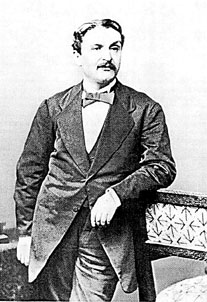Hermann Wallich

Hermann Wallich (born December 28, 1833 in Bonn , † April 30, 1928 in Berlin ) was a German banker .
Life
Wallich came from a Jewish-Orthodox merchant family based in the Rhineland . His father Joseph ran a hide trade. After completing a banking apprenticeship in Cologne, Wallich worked for fifteen years from 1854 for various French banks, most recently as head of the Shanghai branch of the Comptoir d'Escompte .
In 1870 Wallich was appointed to the board of the Deutsche Bank , which had just been founded, on the recommendation of Ludwig Bamberger . In the decades that followed, Deutsche Bank developed under the direction of Wallich and Georg Siemens (later also Max Steinthal and Rudolph Koch ) into one of the most important major banks in Germany. Wallich was responsible in particular for expanding the deposit and foreign business, while Siemens was primarily responsible for industrial financing.
Siemens' biographer Karl Helfferich described Wallich's importance for Deutsche Bank as follows:
“In him, Deutsche Bank received one of its most valuable strengths from the start. ... His absolute mastery of overseas business, his vast commercial experience, his penetrating mind and his always calm, weighing judgment - all of these qualities helped make Deutsche Bank what it is today. Wallich was the given addition for Siemens, whose strength lay primarily in the conception of generous businesses ... "
In 1894 Wallich moved from the executive board to the supervisory board of Deutsche Bank, a member of which he remained until his death.
In 1875 Hermann Wallich married Anna Jacoby. The couple had the daughter Ilse (* 1880), who married the lawyer and later President of the German and Prussian City Council, Oskar Mulert (1881–1951), and their son Paul Wallich (1882–1938), who also worked as a banker . Wallich had his children baptized Lutheran to facilitate their assimilation ; he did not convert himself. In 1877 Wallich joined the Society of Friends . In 1878 he inherited the Villa Schöningen in Potsdam from his father-in-law Moritz Jacoby , a classicist house built in 1843 by the architect Ludwig Persius , which is now part of the Berlin-Potsdam UNESCO World Heritage Site .
Wallich's grandchildren left Germany during the Nazi era , including Henry C. Wallich (1914–1988), who later became Professor of Economics at Yale University and wrote a standard work on the German economic miracle of the 1950s (" The Mainsprings of the German Revival ").
literature
- Two generations in German banking. By Hermann Wallich and Paul Wallich, with an introduction by Henry C. Wallich. Fritz Knapp Verlag, Frankfurt am Main 1978. (= series of publications by the Institute for Research on Bank History, Vol. 2.)
- Katie Hafner: The house by the bridge. The Schöningen Villa in Potsdam and its residents. Märkischer Verlag, Wilhelmshorst 2004.
- Reinhard Frost: Hermann Wallich. Banker in Paris, Shanghai and Berlin. (= Jewish miniatures , volume 193, edited by Hermann Simon ). Hentrich & Hentrich , Berlin 2016, ISBN 978-3-95565-174-9 .
Individual evidence
- ^ Karl Helfferich: Georg von Siemens. A picture of life from Germany's great times. Springer Verlag, Berlin 1921, first volume, p. 228 f.
Web links
| personal data | |
|---|---|
| SURNAME | Wallich, Hermann |
| BRIEF DESCRIPTION | German banker |
| DATE OF BIRTH | December 28, 1833 |
| PLACE OF BIRTH | Bonn |
| DATE OF DEATH | April 30, 1928 |
| Place of death | Berlin |
